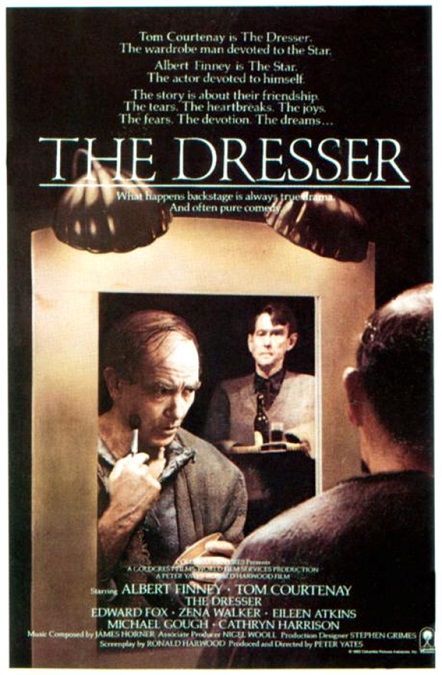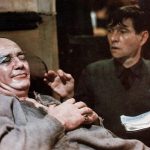
The Dresser – 1983
The Dresser was a confusing, stuffy, British drama. The film’s main protagonist is Norman, played by Tom Courtenay. He is a dresser, or possibly a volunteer manservant to a great and pompous thespian, referred to only as Sir, and played by Albert Finney. He has been doing Shakespeare for so long that he has every role memorized. He is highly respected for his work. Those who work with him, and those who go to the theatre to watch him seem to worship the ground on which he walks.
Norman, on the other hand, prefers to stay in the background, but derives immense pleasure in being the man who takes care of him. Norman has a great sense of self-importance, making sure that Sir is always ready to perform, making sure that he has on the right costume and the right makeup.
The film’s conflict is that Sir is very old and losing his mind. He is prone to fits of mad shouting and raving. He drinks and has a bad heart. But the theatre company puts up with his cantankerous behavior because of his unparalleled skill as a Shakespearean actor. He berates other actors during performances, telling them how to deliver their lines. He belittles them and puts them down after the curtain has fallen, complaining about their performances or their makeup.
The plot of The Dresser centers on Sir’s performance of the Bard’s King Lear. Sir has a mental breakdown the morning before the performance and can barely remember the lines he is supposed to deliver on the stage. But remember, the movie’s protagonist isn’t Sir, but Norman. The drama of the film is Norman’s struggle to get Sir dressed, made-up, and mentally able to play King Lear.
That’s all very well and good. But the film came off to me, much as did the character of Norman, himself: pretentious, self-important, and stuffy. It heavily implied that Shakespearean theatre is inherently better than any other kind of theatre, and that King Lear is the Best of Shakespeare’s plays. It also implies that only the most skilled actors should ever attempt to play the role because none but the best actors in the world would ever be able to do the part justice. In that same light, Norman’s theatre company was the best company in existence, Sir was the best actor in the company, making him the best actor in existence, and Norman was the only dresser in the world who could take care of him properly. He was the only man who knew just how to pamper and coddle him to get him to go on the stage and give another flawless performance.
The Dresser was based on a play of the same name, written by Ronald Harwood. The complex relationship between Norman and Sir gave the plot its drama, and while it certainly did that, I felt that the film was just too stuffy and boorish to catch my interest. Sure, Finney played the part as it was supposed to be played, and he played it well, but there was just too much shouting and too many over-exaggerated emotions that beat me over the head, saying “This is a serious drama! You will now stand in awe of how serious and dramatic we are being!”
My favorite parts were the quieter moments, like the one in which Sir has a private conversation with the stage manager, Madge, played by Eileen Atkins. She admitted to living an unhappy life, pining after Sir for many long years, staying on as the company’s stage manager only to be near him. Sir admits to knowing of her affections, sorry that he was never able to respond in kind.
But the ending tore those quiet moments to pieces. Norman, who, in taking care of Sir’s failing mental state in order to get him to perform King Lear, has been driven to drink. After the most stunning performance of Sir’s career, he retires to his private dressing room and dies. The heavily inebriated Norman learns that Sir has had very little appreciation for him. Norman has a loud and bombastic emotional breakdown of his own, sobbing and pathetically crying, “What am I going to do now?” The one thing that made him feel important was now gone. A powerful ending? Yes, but overdone and without an ounce of subtlety. I was just glad all the screaming and shouting was done.








